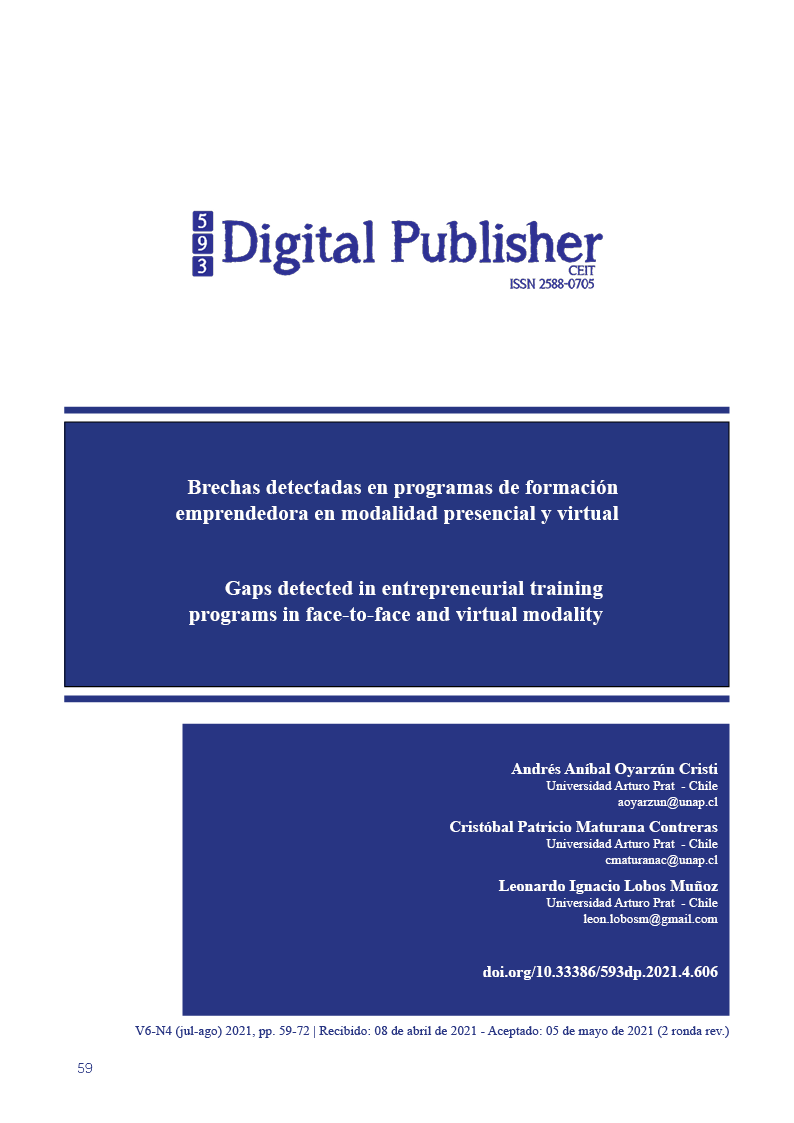Gaps detected in entrepreneurial training programs in face-to-face and virtual modality
Main Article Content
Abstract
The effects of the pandemic are multiple, but it generates a day-to-day impact on training and education programs as well as on the generation of employment and entrepreneurship. For this reason, it is that the gaps in the results of an entrepreneurial training program in early-stage students are studied, which has already been developed in person and in the last year has been adapted to virtual modality. The main objective is to evaluate which the differences are - positive or negative - and suggest some lines of improvement based on the obtained results. The methodology is based on the application of measurement of the Entrepreneurial Characteristics of People of the participants, both at the beginnings and at the endings of the program, for after statistically analyze and conclude relevant aspects.
In sample concepts, three programs of equal duration in hours are considered, one face-to-face carried out in 2020 and two virtual versions executed during 2021. The main results indicate that there is no greater difference in the experiences, having as justification the management of the equipment reporter, but there is a decrease in the first virtual version where it is suggested that it was necessary to consider new elements and variables to achieve the expected results. It is understood that improvements should continue to be applied to reduce the existing gaps between the modalities, virtual programs being a source of exploration and generation of new initiatives.
Downloads
Article Details

This work is licensed under a Creative Commons Attribution-NonCommercial-ShareAlike 4.0 International License.
1. Derechos de autor
Las obras que se publican en 593 Digital Publisher CEIT están sujetas a los siguientes términos:
1.1. 593 Digital Publisher CEIT, conserva los derechos patrimoniales (copyright) de las obras publicadas, favorece y permite la reutilización de las mismas bajo la licencia Licencia Creative Commons 4.0 de Reconocimiento-NoComercial-CompartirIgual 4.0, por lo cual se pueden copiar, usar, difundir, transmitir y exponer públicamente, siempre que:
1.1.a. Se cite la autoría y fuente original de su publicación (revista, editorial, URL).
1.1.b. No se usen para fines comerciales u onerosos.
1.1.c. Se mencione la existencia y especificaciones de esta licencia de uso.
References
Alcántara, A. (2020). Educación superior y COVID-19: una perspectiva comparada. Educación y pandemia. Una visión académica, 75-82.
Barba B., D. (2013). “Características Emprendedoras Personales (CEP) De hombres y mujeres gerentes de las Cooperativas de Ahorro y Crédito de Riobamba: investigación 2010-2011”. Ciencia Unemi, 6(9), 62-68. DOI: https://doi.org/10.29076/issn.2528-7737vol6iss9.2013pp62-68p
Casal, S. M. S. (2004). Metodología didáctica en entornos virtuales de aprendizaje. Etic@ net: Revista científica electrónica de Educación y Comunicación en la Sociedad del Conocimiento, (3), 15.
Díaz, C.; Sáez, F. & Jiménez, J. (2015). “Evaluación del impacto del programa educativo “Emprendedores” en la intención emprendedora de los participantes”. RUSC. Universities and Knowledge Society Journal, vol. 12, núm. 3, julio, 2015, pp. 17-31. [Fecha de Consulta 17 de Febrero de 2020]. Disponible en: https://www.redalyc.org/pdf/780/78038521002.pdf
Esteban, A. M., & Zapata, R. M. (2016). Estrategias de aprendizaje y eLearning. Un apunte para la fundamentación del diseño educativo en los entornos virtuales de aprendizaje. Revista de Educación a Distancia (RED), (50).
García, L. (2017). Educación a distancia y virtual: calidad, disrupción, aprendizajes adaptativos y móvil. Revista Iberoamericana de Educación a Distancia, 20(2), 9-25.
García-Peñalvo, F. J., Abella-García, V., Corell, A., y Grande, M. (2020). La evaluación online en la educación superior en tiempos de la COVID-19. Education in the Knowledge Society 21, article 12. DOI: https://doi.org/10.14201/eks.23013
García-Planas, M. I., & Torres, J. T. (2021). Transición de la docencia presencial a la no presencial en la UPC durante la pandemia del COVID-19. IJERI: International Journal of Educational Research and Innovation, (15), 177-187.
Gómez N., Liyis; Llanos M., M.; Hernández R., T.; Mejía R., D.; Heilbron L., J.; Martín G., J.; Mendoza S., J.; Senior R., D. (2017). “Competencias emprendedoras en Básica Primaria: Hacia una educación para el emprendimiento”. Pensamiento & Gestión, núm. 43, julio-diciembre, 2017, pp. 150-188. [Fecha de Consulta 17 de Febrero de 2020]. Disponible en: http://dx.doi.org/10.14482/pege.41.9704
Gonzalez, L., Gomez, M. C., & Echeverri, J. A. (2017). Motivation and Virtual Education in Computer Science: Case Universidad de Medellín-Colombia. IEEE Latin America Transactions, 15(6), 1176–1181. https://doi.org/10.1109/TLA.2017.7932706
Gutiérrez Ochoa, S. M., & Díaz Torres, C. H. (2021). La educación virtual en tiempos de pandemia. Revista Gestión y Desarrollo Libre, 6(11)
Krauss, C. (2011). Actitudes emprendedoras de los estudiantes universitarios: El caso de la Universidad Católica del Uruguay. Dimensión empresarial, 9(1), 28-40.
Landeros, J. A. (2021). El Aula Virtual como Estrategia Didáctica en un Mundo Transformado por el Covid-19. Revista RedCA, 3(9), 41-60.
Lara, L. R. (2002). Análisis de los recursos interactivos en las aulas virtuales. Obtenido de http://www.quadernsdigitals.net/datos/hemeroteca/r_43/nr_479/a_6424/6424.pdf
Llorens-Largo, F. (2020). Recomendaciones para una docencia no presencial y apoyada con tecnología. Recuperado de https://bit.ly/34kYXS5
López, M. J. C., Castillo, A. L., Maldonado, A. A. P., & Casados, J. C. (2021). Ambientes de aprendizaje: del aula presencial a las plataformas virtuales. Revista Ibérica de Sistemas e Tecnologias de Informação, (E39), 26-32.
Lozano Rodríguez, A., & Burgos Aguilar, J. V. (2012). Tecnología Educativa, en un modelo de educación a distancia centrado en la persona. México: Limusa.
Oyarzún, A., Maturana, C., & Ayala, E. (2020a). Impacto de la formación emprendedora en estudiantes de etapas tempranas. 593 Digital Publisher CEIT, 5(6), 117-130. https://doi.org/10.33386/593dp.2020.6.374
Oyarzun, A., Maturana, C., & Ayala, E. (2020b). Modelo educativo para el fortalecimiento de la cultura emprendedora en etapas tempranas. 593 Digital Publisher CEIT, 5(5-2), 4-17. https://doi.org/10.33386/593dp.2020.5-2.248
Pardo-Iranzo, V. (2014). La docencia online: ventajas, inconvenientes y forma de organizarla. Iuris Tantum Revista Boliviana de Derecho, 18, 622-635.
Patton, W.,& McMahon, M. (2006). “Career Development and Systems Theory. Connecting Theory and Practice”. Rotterdam: SensePublishers
Rivera Cabrera, A., Viera Díaz, L., & Pulgarón Decoro, R. (2010). La educación virtual, una visión para su implementación en la carrera de Tecnología de la Salud de Pinar del Río. Educación Médica Superior, 24(2), 0-0.
Salado, L., Amavizca, S., Richart, R., Rodríguez, R. (2020). “Alfabetización digital de estudiantes universitarios en las modalidades presencial y virtual”. Revista Electrónica de Investigación e Innovación Educativa. Enero-Marzo, Vol. 5- Núm. 1, p. 30-47.
Sánchez, M.; & Suárez, M.. (2017). “Diseño y Validación de un Instrumento de Evaluación de Competencias para la Gestión de la Carrera Emprendedora”, Revista Iberoamericana de Diagnóstico y Evaluación - eAvaliação Psicológica, vol. 3, núm. 45, 2017, pp. 109-123. [Fecha de Consulta 17 de Febrero de 2020]. Disponible en: https://www.redalyc.org/jatsRepo/4596/459653862010/459653862010.pdf
Sastre, S. G., Ortega-Arranz, A., Gómez-Sánchez, E., & Villagrá-Sobrino, S. (2019). Reflexiones para la introducción de Colaboración y Gamificación en MOOC. Revista Latinoamericana de Tecnología Educativa, 18(1), 163–174. https://doi.org/10.17398/1695-288X.18.1.163
Savickas, M. L. (2013). “The theory and practice of career construction. In S. D. Brown & R. W. Lent (Eds.)”, Career development and counselling: Puttingtheory and research to work(2ª Ed.) (pp. 147-183). Hoboken: Wiley.
Stojanovic, L. (2009). Tecnologías de comunicación e información en educación: Referentes para el análisis de entornos virtuales de enseñanza y aprendizaje. Revista de Investigación, 32(65), 33-68.
Torrecillas, C. (2020). El reto de la docencia online para las universidades públicas españolas ante la pandemia del Covid-19. ICEI Papers COVID-19, (16). Recuperado de: https://eprints.ucm.es/60050/
Torres Barreto, M., Acosta Medina, J., & Paba Medina, M. (2021, February). DIDACTIC-Gamificación e inteligencia artificial como apoyo a los programas educativos virtuales. In Proceedings INNODOCT/20. International Conference on Innovation, Documentation and Education (pp. 443-450). Editorial Universitat Politècnica de València.




